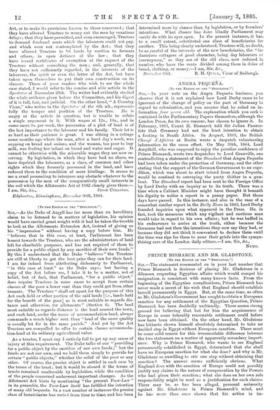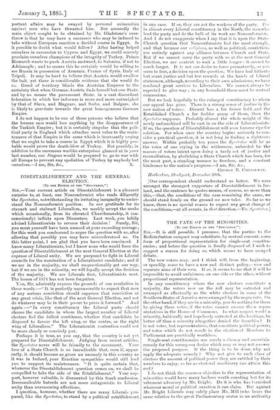PRINCE BISMARCK AND MR. GLADSTONE.
[To THE EDITOR OF THE " SPECTATOR."]
SiR,—The statement commented on in your last number that Prince Bismarck is desirous of placing Mr. Gladstone in a dilemma respecting Egyptian affairs which would compel his resignation, is consistent with many known facts. From the beginning of the Egyptian complications, Prince Bismarck has never made a secret of his wish that England should establish herself permanently in Egypt. But, at the same time, as often as Mr. Gladstone's Government has sought to obtain a European sanction for any settlement of the Egyptian Question, Prince Bismarck has been decidedly unfriendly. There seems strong ground for believing that but for him the acquiescence of Europe in some tolerably reasonable settlement could before now have been obtained. On the other hand, Mr. Gladstone has hitherto shown himself absolutely determined to take no decided step in Egypt without European sanction. There must be some solid reason for this irreconcilable difference between the two statesmen on a matter of apparently secondary importance. Why is Prince Bismarck, who wants to see England permanently established in Egypt, determined that she shall have no European sanction for what she does ? and why is Mr. Gladstone so unwilling to stir one step without obtaining that sanction ? The answer seems sufficiently obvious. What England does with the sanction of Europe could not possibly justify any claims in the nature of compensation by the Powers who had given their sanction ; what she does on her own sole responsibility might be used as a justification for such claims. There may be, as has been alleged, personal animosity against Mr. Gladstone in Prince Bismarck's mind, and he has more than once shown that his action in im portant affairs may be swayed by personal animosities against men who have thwarted him. But assuredly the main object sought to be obtained by Mr. Gladstone's overthrow is that he ►nay have a successor who may be induced to take without European sanction a decided course in Egypt. Is it possible to doubt what would follow ? After having helped ourselves in succession to Cyprus and Egypt, we could scarcely proclaim ourselves champions of the integrity of Turkey. Prince Bismarck wants to push Austria eastward, to Salonica, if not to Adrianople ; and to secure this he certainly would be willing to see Russia in possession of Armenia. France of Syria. Italy of Tripoli. It may be hard to believe that Austria would swallow the bait, yet there is considerable evidence that she would do so. Greed of territory blinds the Austrian Emperor to the certainty that when German-Austria finds herself but one State, and by no means the paramount State, in a vast discordant federation in which her influence is more and more outweighed by that of Slays, and Magyars, and Serbs, and Bulgars, she is likely to gravitate towards the great homogeneous German Empire.
I do not happen to be one of those persons who believe that the human race would lose anything by the disappearance of the Turkish Empire ; but it is certainly singular that the political party in England which attaches most value to the maintenance of that Empire is the same which is incessantly urging that we ought to take a course in Egypt which it is highly probable would prove the death-blow of Turkey. But possibly, in addition to the enormous warlike enterprises glanced at in your last number, our Jingoes would be prepared to go to war with all Europe to prevent any spoliation of Turkey by anybody but ourselves.—I am, Sir, &c., X.











































 Previous page
Previous page